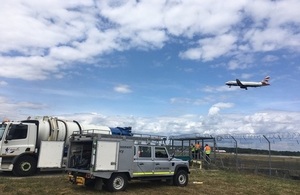Emergency response prevents huge fish deaths at the River Mole
Specialist Environment Agency officers have been called into action to prevent widespread fish deaths at the River Mole near Gatwick Airport.

Environment Agency called into action to prevent widespread fish deaths at the River Mole near Gatwick Airport.
Since the weekend, fish have been in distress in the River Mole due to environmental impacts caused by the current hot and dry weather conditions. The Environment Agency has been at the watercourse throughout to take all necessary actions to prevent widespread fish deaths and to use re-oxygenating equipment to boost levels in the river.
Sadly, a significant number of fish, including perch, pike and roach have already died as a result of the naturally occurring incident. Due to the Environment Agency’s emergency response it is hoped that now oxygen levels are stable, thousands more fish have now been saved.
Anna Burns, Environment Manager at the Environment Agency, said:
Our officers have worked around the clock to prevent widescale fish deaths at this much-loved river. It is distressing that a large number of fish had perished ahead of our efforts, but our swift emergency response has ensured that many more will now be saved.
We have worked in partnership with Gatwick Airport and Thames Water and we thank them for their valuable assistance regarding this incident. We will all continue to work to prevent further fish deaths and reduce potential harm to local wildlife.
During summer the Environment Agency regularly respond to reports of fish in distress due to natural processes reducing oxygen levels in the water. Hot, sunny weather can lead to low flows in rivers and still water fisheries (ponds and lakes) start to warm up.
Small still waters are particularly susceptible. Rescuing fish is part of the Environment Agency’s fisheries management role. Fisheries teams are trained to use aeration equipment or hydrogen peroxide to restore dissolved oxygen levels. When necessary, fish will be rescued and transferred to safety.
Members of the public are encouraged to report any sightings of fish in distress to us via the Environment Agency’s 24-hour emergency hotline: 0800 807060.